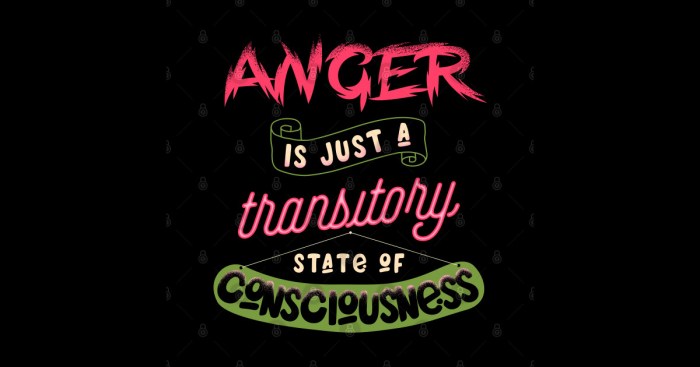Anger is a transitory state of consciousness meaning – Anger, a transitory state of consciousness, is a complex and multifaceted emotion that can have significant consequences on our well-being and relationships. Understanding the nature and dynamics of anger is crucial for effectively managing and harnessing its power.
This comprehensive guide delves into the definition, causes, effects, and management of anger, providing a thorough examination of this transient yet potent emotion.
Anger as a Transitory State of Consciousness

Anger is a transitory state of consciousness characterized by intense feelings of displeasure, hostility, and the urge to inflict harm on oneself or others. It is distinct from other emotions such as sadness, fear, and joy, as it involves a heightened sense of arousal and a desire to act.
Causes of Anger

Anger can be triggered by a wide range of stimuli, including:
- Threats to one’s physical or psychological well-being
- Frustration or obstacles to achieving goals
- Injustice or unfair treatment
- Perceived disrespect or criticism
Psychological and physiological factors can also contribute to anger, such as:
- Personality traits, such as irritability or aggression
- Cognitive distortions, such as catastrophizing or blaming others
- Neurochemical imbalances, such as low serotonin levels
Effects of Anger: Anger Is A Transitory State Of Consciousness Meaning

Anger can have both immediate and long-term consequences for the individual, including:
- Increased heart rate, blood pressure, and muscle tension
- Difficulty concentrating or making decisions
- Aggressive behavior or violence
- Relationship problems
- Mental health issues, such as anxiety or depression
Managing Anger
Effective anger management involves identifying and controlling anger triggers and expressing anger in a healthy and constructive manner. Techniques include:
- Cognitive restructuring: Identifying and challenging negative thoughts that contribute to anger
- Relaxation techniques: Practicing deep breathing, meditation, or progressive muscle relaxation
- Communication skills: Assertively expressing needs and boundaries without aggression
- Problem-solving: Focusing on finding solutions to anger-provoking situations
Applications in Psychology

The concept of anger as a transitory state of consciousness is widely used in psychological therapy, including:
- Anger management therapy: Helping individuals understand the causes and effects of anger and develop effective coping mechanisms
- Cognitive-behavioral therapy: Identifying and changing negative thoughts and behaviors that contribute to anger
- Dialectical behavior therapy: Teaching individuals to regulate emotions, including anger, and improve interpersonal relationships
Expert Answers
What are the key characteristics of anger?
Anger is typically characterized by feelings of irritability, hostility, and aggression. It can also manifest physically through increased heart rate, muscle tension, and changes in facial expression.
What are the common triggers of anger?
Anger can be triggered by a wide range of factors, including perceived threats, frustrations, injustices, and personal attacks.
What are the potential consequences of anger?
Uncontrolled anger can lead to negative outcomes such as relationship problems, poor decision-making, and physical health issues.
How can anger be managed effectively?
Effective anger management involves identifying triggers, practicing relaxation techniques, and developing healthy coping mechanisms.
What is the role of anger in psychological therapy?
In therapy, anger can be explored as a symptom of underlying emotional issues and used as a catalyst for personal growth and healing.
